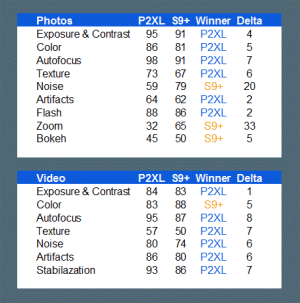Wait, I'm not here to bash. I'm only here to point out that an aggregate score is not necessarily indicative of performance WHERE IT MATTERS.
Case in point, the individual category scores from the S9+ compared to the Pixel 2. Zoom and bokeh are two primary reasons why the aggregate score is better on the S9+ (noise being the third, but that wouldn't make up the difference if you remove zoom and bokeh), even though the Pixel 2 probably does better in every other situation and does score higher in all other categories (again, aside from noise).
What I wouldn't mind is having a discussion about why DXO inherently handicaps phones that only have one rear camera versus two. It seems a bit.....disingenuous? I think I would like to see them give scores that don't include those categories, and then scores that do. I'd even be willing to say that leaving bokeh makes some sense since at least one company with a single rear camera makes claims to be able to do bokeh just fine (but doesn't quite match phones with two rear cameras).
https://twitter.com/mkbhd/status/969194721703849984?s=21 (shared his tweet for the reply with the individual category scores next to each other)
Case in point, the individual category scores from the S9+ compared to the Pixel 2. Zoom and bokeh are two primary reasons why the aggregate score is better on the S9+ (noise being the third, but that wouldn't make up the difference if you remove zoom and bokeh), even though the Pixel 2 probably does better in every other situation and does score higher in all other categories (again, aside from noise).
What I wouldn't mind is having a discussion about why DXO inherently handicaps phones that only have one rear camera versus two. It seems a bit.....disingenuous? I think I would like to see them give scores that don't include those categories, and then scores that do. I'd even be willing to say that leaving bokeh makes some sense since at least one company with a single rear camera makes claims to be able to do bokeh just fine (but doesn't quite match phones with two rear cameras).
https://twitter.com/mkbhd/status/969194721703849984?s=21 (shared his tweet for the reply with the individual category scores next to each other)





